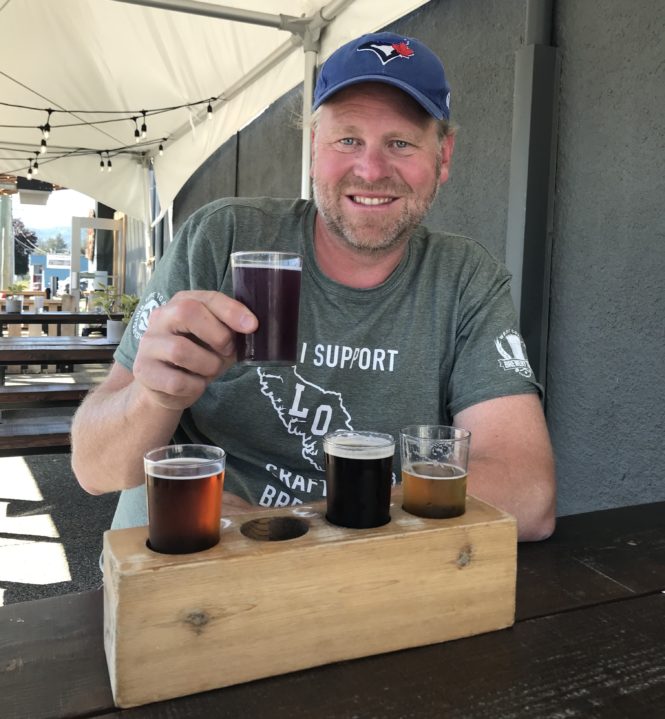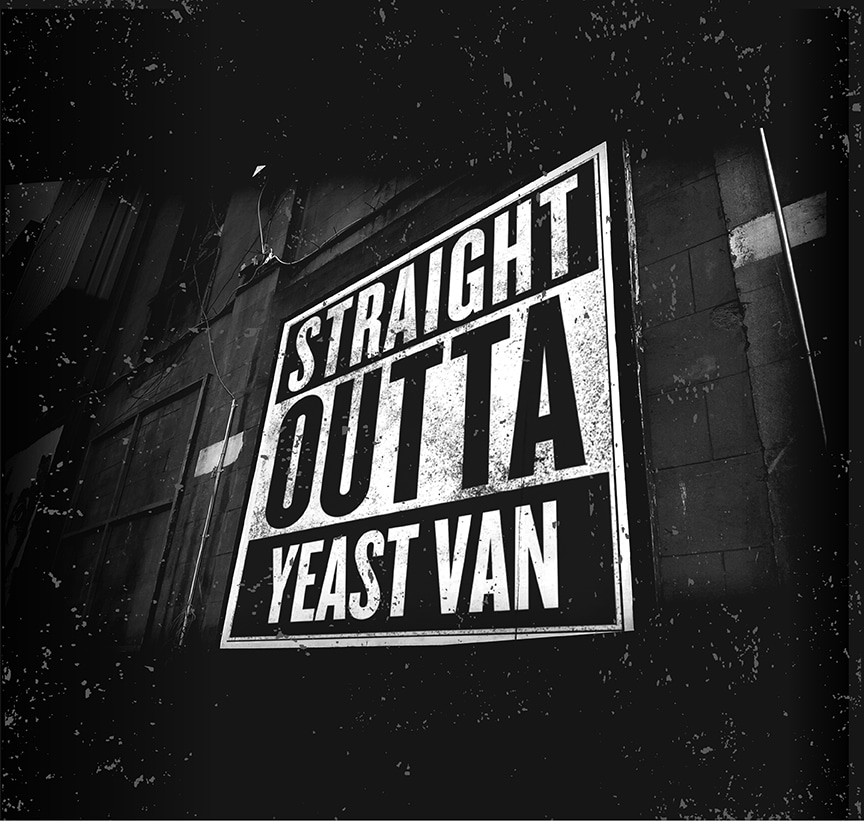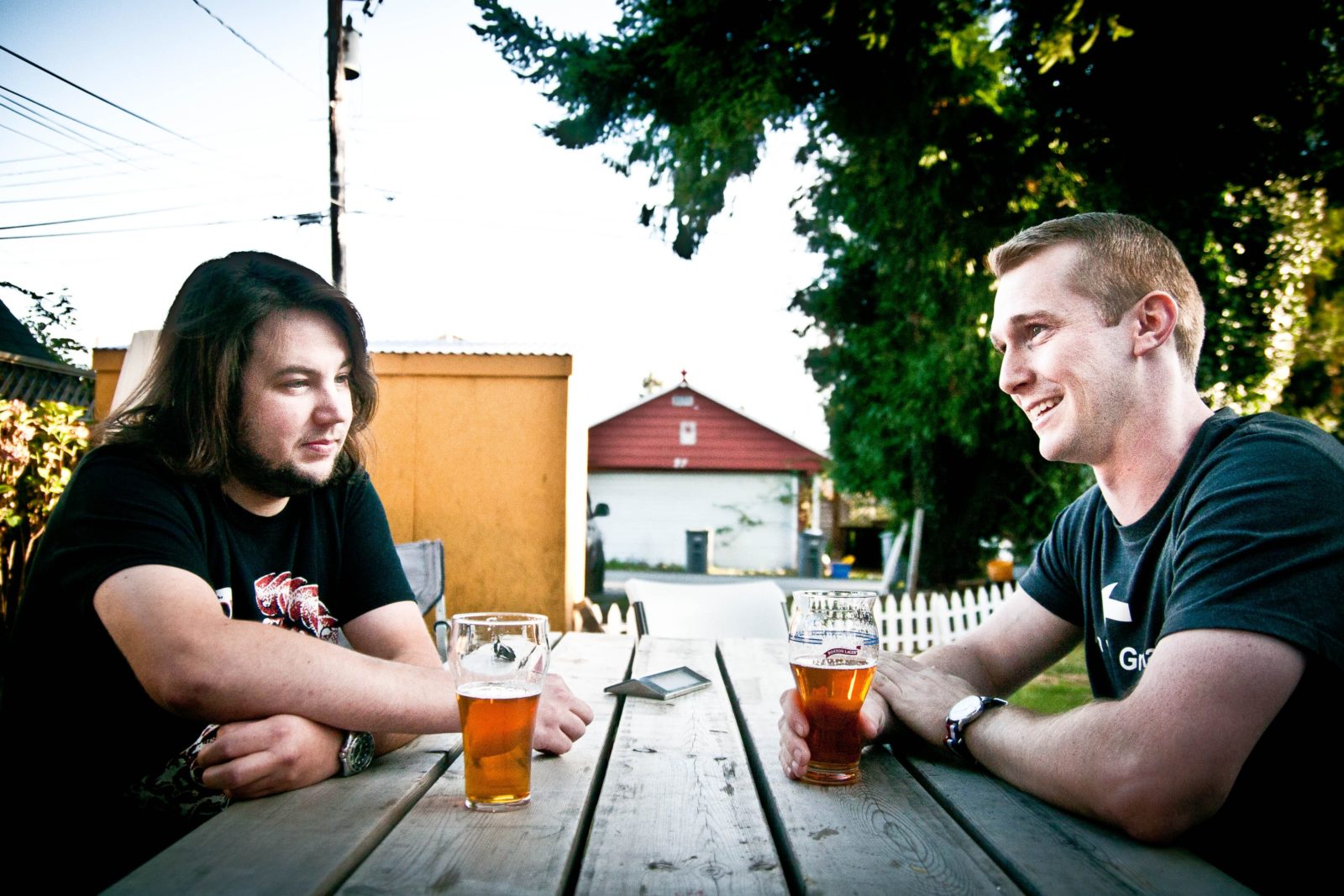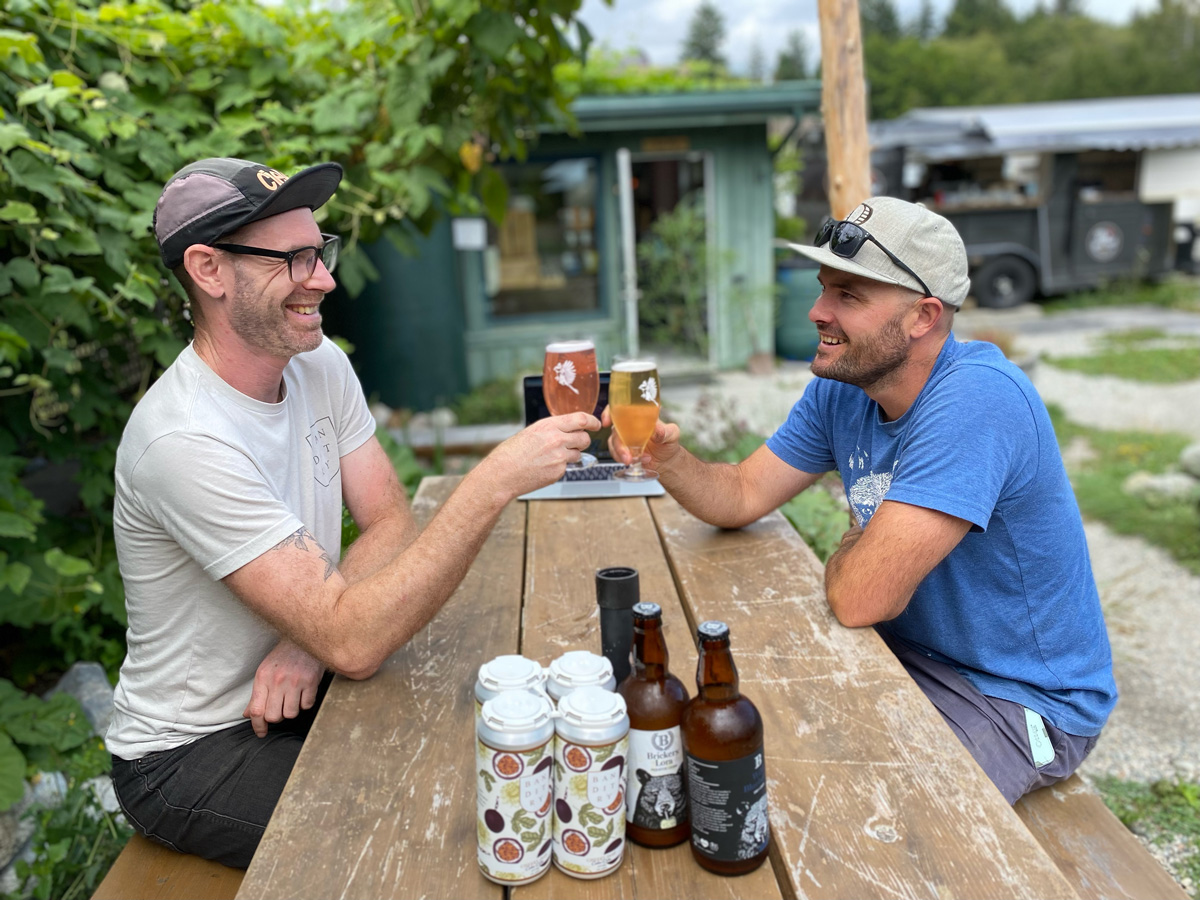
For this edition of Brewer vs. Brewer I talked to two ex-brewers who now make cider: Matt Cavers, cidermaker at Banditry Cider, which placed second in the Growlies for Cidery of the Year (who often writes in these pages himself); and Nick Farrer, founder and cidermaker at The Bricker Cider Co., which won the Growlie for Cidery of the Year as well as for Best Brewery/Cidery Tasting Room.
Both cideries are in the Gibsons area on the Sunshine Coast so Matt and Nick sat down at a table outside on the patio at Banditry and chatted with me via Zoom. I started by asking them how they transitioned from beer to cider.
Nick Farrer: When I moved to Canada 12 years ago [from England] I was working in Alberta in the oil and gas industry. It wasn’t particularly fun, frankly. I realized if I want to spend time with my wife and we’re going to be settling down properly with kids in the future, I should look to do something I’m a bit more passionate about. This was in 2013, 2014, and the industry was starting to really take up then.
So I got a job at Steamworks in Burnaby working on the canning line, just packing cans. I come from an engineering background so I quickly worked my way up to being a brewer there. I worked there three years and in that time I realized that there was this opportunity in the cider market. There wasn’t much cider going on, and my wife’s family had an old heritage orchard here on the Sunshine Coast, and everything kind of fell together.
Matt Cavers: I was doing my master’s degree in geography when the idea of making beer at home occurred to me, and I got really into it because it was more immediately rewarding than writing papers. I carried on with homebrewing for several years, and I was well into my PhD when a brewing buddy of mine got a job at Persephone as the manager there. He said, “Hey, there’s a job for you there,” and I said, “I don’t think so. I’m getting a PhD!” And then a month went by and I emailed him to ask him for a job.
I was at Persephone for five years. and while there I got involved in their cider program and was happy to get that off the ground. Honestly, I’ve learned everything I know about cider by asking people how it works and having people like Nick on the other end of my phone where I can text him and ask “How do I do this?” And just by doing it.
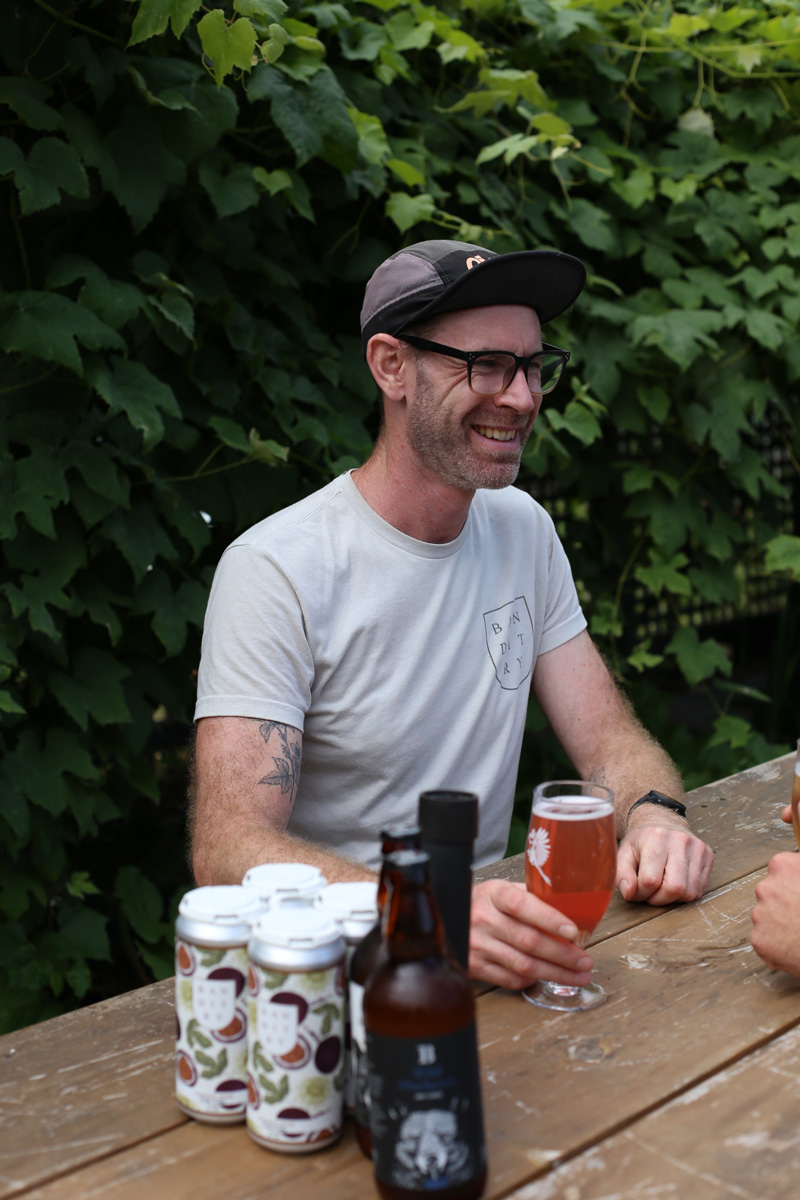
Joe: What is the main difference between making beer and cider?
Matt: I feel like in the Cider Workshop Google group there are 10 or 12 old guys ready to jump in if someone is unfortunate enough to say, “Hey, I brewed some cider,” to say [in a rustic English accent], “Cider isn’t brewed; cider is made.” [much laughter from both]
Nick: I would say the main difference is more at the growing end. I feel like the emphasis is more on the core, raw product with cider than it is with beer.
Matt: Your apples really determine what kind of thing you’re going to end up with. And apples have a season, obviously, and you can’t store them in silos the way you can store malt. You have to do a lot more forward planning to ensure that you’re going to have juice to put into tanks to satisfy your customers’ needs over the summer.
Nick: I think most other craft cideries make everything just after the pressing season. So from October into January they have big fermenters all full of juice fermenting away, and then it’s packaging season, and then it’s sales season, and then you’re back to picking and pressing again. Frankly, we didn’t have the money to buy massive fermenters so we cold store our juice and use it as we need it so we make it year-round more like a brewery.
Joe: Do you use your own apples?
Matt: Our orchard is fairly small and under development, but the fruit we grow on site I press myself and use it for our most specialty products where the quality of the apples and the uniqueness of the varieties is going to come through. For our core products, I’m using juice from the Okanagan because that’s where it’s most economical to get large quantities of juice.
Nick: If we were in the western part of England or in Wales or northern France, we’d be getting amazing cider-varietal juice shipped to us all the time, right?
Matt: I try not to think about that.
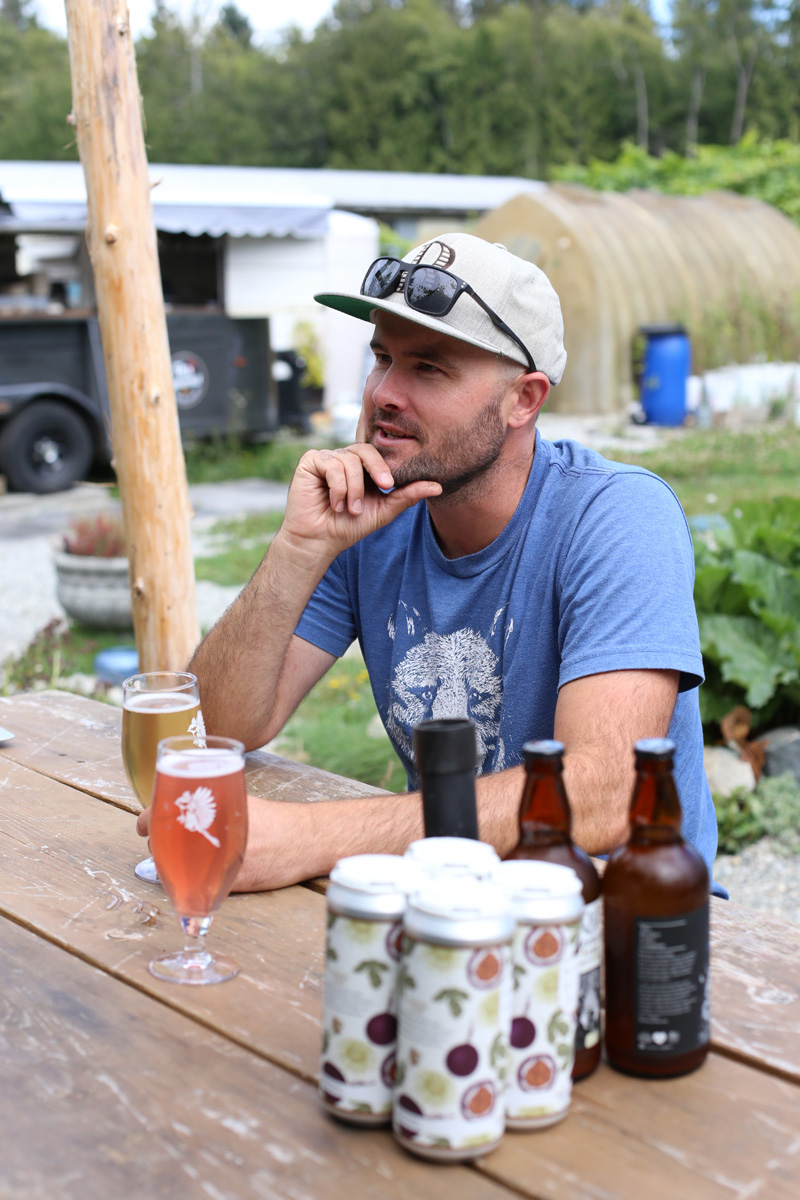
Nick: We have two different growers that have cider varietals so we blend cider-specific juice into culinary apple juice because we just can’t get the volume of straight-up cider apple juice.
Joe: Is there a different vibe to the brewery and cidery communities?
Nick: On the Sunshine Coast, if you count Persephone, we have four cideries. And Matt, myself and Persephone being a brewery, are always totally happy to throw ideas at each other. I don’t know if it’s the same outside the Sunshine Coast.
Matt: I’m really curious if it is. I hope it is.
Nick: I know I’ve asked things of people and they can be a little guarded.
Matt: I wouldn’t say in B.C., but chatting with people further afield, there’s been a sense of “I can’t tell you this because this is how I do it.” Which is funny …
Nick: Why would someone from, say, New York State, not want to tell you the thing, right?
Matt: We can’t get their cool apples anyway… I think also cider is closer to the world of winemaking where production is seen as kind of a black art. We don’t share everything because we do things the way, you know, our founder did it three generations ago.
Nick: And yet, it’s way more complex, isn’t it?
Matt: Cidermaking or?
Nick: Beer making. Like the actual production from raw material to—
Matt: Yeah, I suppose so. Is it?
Nick: [sheepishly] I would say so.
Matt: Yeah, I kind of agree. [laughs] We don’t want to come off sounding like making cider is easy.
Nick: Maybe the cider and wine industry are more guarded because people don’t want to let out the secret that it’s not that hard.
Matt: [looks into the camera] So we’re just squeezing stuff into a bucket and letting it ferment. Now you know.
Nick: Not quite 100% true.
Matt: You have to sanitize the bucket.
Nick: That’s the bit people don’t do.
Joe: So do you guys miss brewing? Or is making cider so easy that you don’t want to do a tougher job? [both laugh]
Nick: There’s a little bit of a joke in there, but… When it comes to making your beverage that day you can’t deny that taking malt and putting it in a fermenter at a fermentable temperature is way more complicated than taking apple juice and putting it into a tank and having it start fermenting.
Matt: [Pointing at the orchard in the background] In cidermaking, your mash tun and your kettle are the orchard and the irrigation system and the climate and the sun.
Nick: That’s right. And post-fermentation as well: there’s lots more going on there.
Matt: On the day you brew versus the day you make cider… yeah, there are days when I do feel a little twinge of nostalgia about how good it smells when you mash it in. It’s so good, right?
Nick: Did you ever just grab a bowl and eat it like cereal?
Matt: No, you can’t digest those husks.
Nick: Out of the mash tun, it’s so good. I used to do it all the time.
Matt: Wow, you’d be so regular! No, but I would occasionally fill up a coffee mug of hot, super strong wort just from the Vorlauf, especially if it was a black lager or a smoked beer. Oh my God, I miss that. But I can’t be bothered—there are so many talented people who make beer that I don’t need to.
Nick: There are so many good beers even just on the coast.
Our conversation continued for a while, including a discussion about where else in the world they would love to visit cideries (Québec, England, France, etc.). Personally, I’d be happy returning to Gibsons—if you’ve never visited Banditry or Brickers, I encourage you to plan a trip to the Sunshine Coast!

